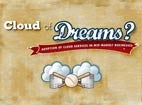Competition in the cloud for backup business has become fierce. EVault, a unit of Seagate, this week announced that it will give one year of free backup service via its software to any customer who signs a Microsoft Azure Enterprise Agreement.
According to Minh Phan, director of endpoint and mobility for EVault, this offering extends an existing relationship between the two companies under which Microsoft already relies on Seagate drives to provide magnetic storage. Because cloud backup services don’t generally turn profitable until year two of a contract, Phan says that getting customers to renew is of critical importance. By giving away the first year of service free, Phan says that EVault is looking to create a critical mass of customers that it can convert into profitable paying customers in 2014. Having similar goals, Microsoft is helping to subsidize the cost of that first year of EVault service.
Phan says what distinguishes EVault from other vendors is its approach to security, which in the wake of the Edward Snowden scandal involving data stolen from the National Security Agency (NSA) is now a much more significant issue in the minds of most customers. Phan says that by giving customers the option to store encryption keys in the cloud, on their own premise or to split the keys between both, EVault makes it a lot more difficult for any administrator to walk off with customer data.
Of course, this latest offer from EVault is clearly aimed at using price to help customers overcome their fears about storing data in the cloud. And once there, Phan says that EVault is betting that customers will be impressed with not only EVault’s security, but also its ability to leverage advanced compression technologies to back up data efficiently in the coming era of Big Data and the ease with which it can meet recovery time and point objectives.
As a way to reduce the volume of data organizations need to locally store, cloud backup services are a tempting option. The only real issue is that organizations need to have confidence that when it comes time to access that data, they are the only ones seeing it.



